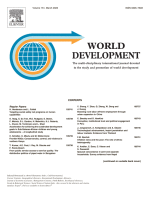Citation:
Hausmann, R. & Schetter, U., 2022. Horrible trade-offs in a pandemic: Poverty, fiscal space, policy, and welfare. World Development , 153. Copy at http://www.tinyurl.com/24aepclk


For additional research view the CID Publications page and the HKS Faculty Research Connection.